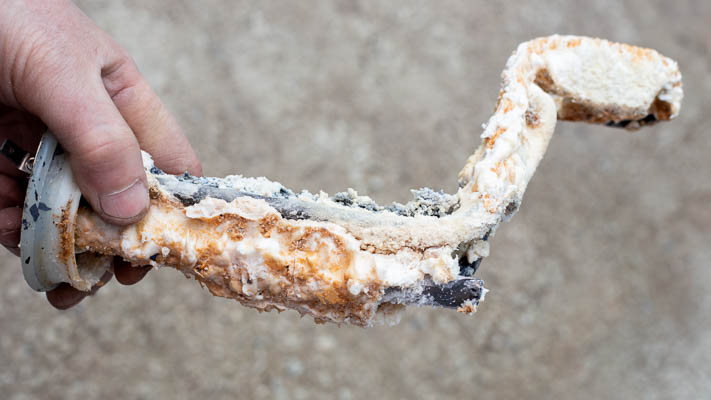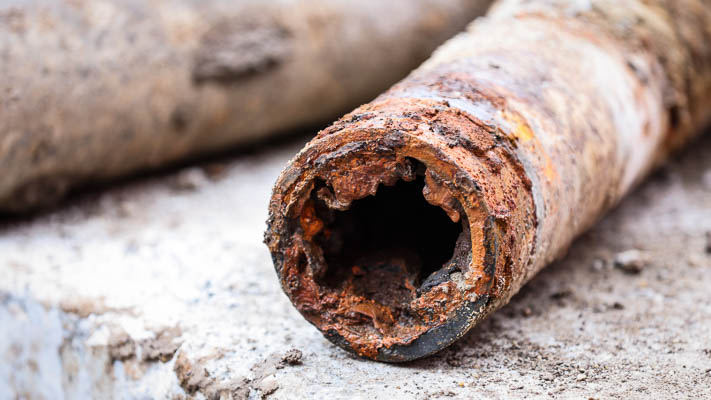The Common Causes of Low Water Pressure
Low water pressure in your home's plumbing can be caused by several problems. We have assembled our top ten list of the most common causes of low water pressure in your home's fresh water lines:
- Old Galvanized Pipes: Over time, old galvanized pipes can corrode and develop rust. This corrosion reduces the inner diameter of the pipes, restricting water flow and causing low water pressure throughout the plumbing system.
- Mineral Buildup in Pipes and Outlets: Minerals like calcium and magnesium can accumulate inside pipes and outlets due to the effects of hard water. This buildup narrows the passage for water, resulting in decreased water pressure as it struggles to pass through the restricted openings.
- Water Leaks in Pipes and Slabs: Water leaks within your plumbing system, especially in concealed areas like pipes within slabs or walls, can result in a loss of pressure. The escaping water reduces the overall flow available to fixtures, leading to low water pressure.
- Restricted Flow in Main Supply to House: If the main inbound water supply line to your house is partially blocked or restricted due to debris, sediment, or even a closed valve, it can limit the amount of water entering your home, leading to low water pressure at all fixtures.
- Low Water Pressure In Municipal Water Supply: A decrease in water pressure from the municipal supply can affect your home's water pressure. This is usually beyond your control and may be caused by maintenance, supply system issues, outages, or high demand in your area.
- Faulty Water Pressure Regulator: A malfunctioning water pressure regulator can fail to maintain pressure in your plumbing system. It may allow excessive pressure to escape, resulting in lower-than-normal water pressure throughout your home.
- Hot Water Tank Heater Issues: Sediment buildup inside a hot water tank can reduce the efficiency of the heater. As a result, it may struggle to deliver hot water at adequate pressure, causing low water pressure in hot water fixtures like showers and faucets.
- Well Water System Malfunctioning: In homes with well water, issues with the well pump or pressure tank can impact water pressure. A malfunctioning well pump may not provide sufficient pressure to meet the demands of your plumbing system, leading to low water pressure throughout your home.
- A Fully or Partially Closed Valve: A fully or partially closed water valve can limit water flow. This affects specific fixtures or areas in your home. If these valves are accidentally closed or not fully open, it can lead to low water pressure in those areas
- Improperly Sized Pipes: Pipes that are too small in diameter for the demand of your plumbing fixtures cannot supply an adequate volume of water. This results in reduced water pressure, especially when multiple fixtures are in use simultaneously.

For a more detailed look at the common causes of low water pressure, check out our ultimate guide.
What is the Difference Between Systemic and Temporary Causes of Low Water Pressure?
There are two types of causes of low water pressure: temporary and systemic.
Temporary Causes
Temporary causes can include municipal water supply outages, closed valves, or high-demand periods. These issues typically arise suddenly and are usually resolved when the circumstances change or are addressed.
Temporary causes can often be remedied quickly by opening valves, waiting for the supply to be restored, adjusting water usage patterns, or fixing individual faulty components within the plumbing system.
Systemic Causes
Systemic causes, like blocked pipes, corroded pipes, or pipes that are the wrong size, lead to ongoing issues. These problems consistently lower water pressure over time.
These issues often require bigger and lasting solutions, including replacing pipes or upgrading the system to help restore proper water pressure throughout the home. We have a detailed article covering the systemic causes of low water pressure.
It's important to tell the difference between these two types of causes when dealing with low water pressure. This helps decide if the problem needs quick action or long-term solutions, like repiping the whole house.
How to Fix Low Water Pressure in the Home
Depending on the type of issue causing low pressure in your home's plumbing, there are several ways to address the problem.
Fixing Low Pressure Caused by Temporary Issues
There are several ways to increase low water pressure from plumbing problems. You can check the mainline water filters, showerhead filters, faucet filters, and outlet valves. These solutions don't require significant repipe work. Some additional issues to consider include:
- Closed Valve: Check for fully or partially closed valves within your plumbing system. Start at the street, inspecting the water meter and main shut-off valves, especially if the pressure drop affects the entire house. For hot water issues, examine valves near the water heater and individual fixtures.
- Water Main Outage: Stay informed about your municipal water supply status through online updates. Temporary water main disruptions in your area may cause pressure drops. Wait for the water utility to resolve the issues
- Pressure Regulator Issue: Older pressure regulators can suddenly fail, potentially causing a drop in water flow. If your regulator is over 10 years old, consider replacing it, especially in areas with hard water.
- Temporary Pipe Clogging from Silt: After local water main work, silt and debris can get into your plumbing. This may cause low water flow. Inspect a fixture like a showerhead for debris behind the screen filter. Remove and clean screen filters on outlets, then flush your plumbing system to clear the silt buildup.
Fixing Low Pressure Caused by Systemic Issues
When dealing with systemic issues causing low water pressure in your home's plumbing, the most common solution is a full home repipe.
Systemic issues, such as old galvanized plumbing or mineral and scale buildup in pipes, significantly restrict water flow throughout your home.

There is no effective way to clean scale or rust inside pipes, so they must be replaced. A whole home repipe will always be the most cost-effective option compared to doing multiple partial replacements section by section.
When it comes to dealing with rust and scale buildup, PEX (cross-linked polyethylene) tubing is generally more effective than other piping materials like copper. The benefits of PEX, including its durability, flexibility, and longevity, generally outweigh those of most other plumbing materials. We utilize Uponor PEX-A tubing for most of our full home repipes.
A Repipe Specialist consultant would be happy to explain all your options, either in person or via a remote consult session. Schedule a free repipe quote.
Get your free estimate today
With over 75,000 repipes completed, we've perfected our One-Stop Repipe™ for your home.
Get a Quote to Repipe to Stop Low Water Pressure
Here at Repipe Specialists, we've replaced the plumbing in over 75,000 homes since 1991, and we frequently receive positive feedback from our customers about how pleased they are with their fast-flowing, high-pressure water after the repipe. We consistently exceed our customers' expectations in the following areas:
- Speed: Our repipe crews typically complete a repipe in a day, returning on another day for wall patching.
- Convenience: Through our One-Stop Repipe™ process, we handle everything from permits, to wall patching, to inspections.
- Cleanliness: Our crews are trained to protect your home while working (we cover all surfaces with protective sheeting), and to clean up fully at the end of each day.
- Peace of Mind: Repipe Specialists is a fully licensed plumber in every state we operate in, and we back all of our repipes with a lifetime warranty.
- Financing programs: To help take the sting out of unplanned repipe expenses, we offer several financing programs.
- Price: As a specialist that performs hundreds of repipes a week, we can deliver high-quality repipes at a lower cost vs generalist plumbers. We have another article that covers whole house repipe cost factors in detail. Our quotes typically range from $4,500 to $15,000 depending on the size and complexity of your project.
Schedule a free in-home consult, and a local repipe consultant will explain all your repiping options and provide you with a written, fixed price quote. Replace your pipes, and enjoy fast-flowing water.

